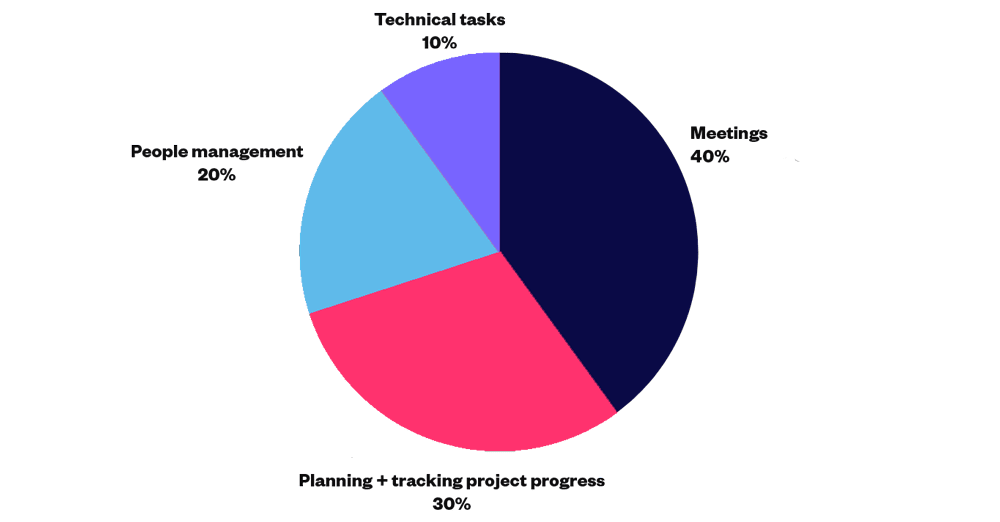This is your last article that you can read this month before you need to register a free LeadDev.com account.
If you’re marketing engineering solutions, a key part of your audience will be Engineering Managers.
So whether you’re sponsoring an event, producing relevant content, or just curious about what Engineering Managers do, we’ve put together this super easy guide on engineering management to get you up to speed with the core aspects of their day job.
Who are they and what do they do?
The who:
Engineering Managers are responsible for the output, productivity and personal progression of their teams. Their main focus centres around the advancement, development and support of their engineers to help software developers flourish within their roles.
Unless an Engineering Manager has previously undertaken a leadership role, this will likely be the first time within their career that they will have stepped into a people management position.
The what:
- Creating high performing teams.
- Boosting the confidence of their team members to deliver projects autonomously.
- Helping their team members to become the best version of themselves.
- Facilitating meetings.
- Developing and expanding their team.
What they don’t do:
Engineering Managers rarely get involved with coding due to a large number of meetings in their calendar. Their role is very reactive, meaning their days are often disrupted and can be pulled out of context at short notice. Thus they become blockers in the process if they are responsible for technical work as their schedules do not easily lend themselves to focus time and can often lead to bottlenecks in projects.
How is their time divided?
Weekly:
A lot of their time is spent in meetings, whether that’s with their direct reports in 1:1s or with the leadership team to discuss the broader strategy and to ensure that the team is moving in the right direction. You’ll also find Engineering Managers conducting code reviews, providing technical direction, facilitating daily sprints and holding retrospectives to flag any issues that are arising on a weekly basis.
Average weekly break down

Quarterly:
Within this wider timeframe, they look closely at hiring new members into their team, conducting performance reviews with their engineers and running team health checks. Other important tasks include setting OKRs for the team, agreeing personal goals with their direct reports and horizon scanning with senior managers to incorporate future projects into their team’s roadmaps.
Annually:
On an annual basis Engineering Managers update career paths for their teams to align with any structural business changes, plan the tech strategy for the next financial year and conduct annual reviews for their team members.
How do they define success and failure?
Success:
This can look like a multitude of things, but often this means happy, high performing teams and having a high retention rate of their talented engineers.
As Engineering Managers are also heavily focussed on the personal progression of their team members, having confident and autonomous team members is a big win for them, as well as high levels of motivation, achieving what they set out to do and being able to communicate the value of their team’s work to the wider business.
Failure:
Whilst this varies from team to team, common key indicators of failure tend to include having a lack of communication with team members, disgruntled direct reports that are unhappy and are lacking psychological safety at work. As well as a lack of transparency, not delivering on targets and having team members relying heavily on them… (notice the people trend?).
What are their key challenges?
Common key challenges for Engineering Managers include managing the velocity and scope of the work that falls within their remit, finding the projects that they can contribute to above the noise and striking the right balance between advancing products and supporting their team.
Additionally, sustaining a level of technical understanding without getting too involved in the process is tricky; becoming too involved can often feel like micro-management and stepping too far away from the tech stack can leave managers feeling out of the loop.
On top of these, you’ll also find them grappling with prioritising the most important work, reducing bugs, balancing features with technical debt, hiring diverse candidates and understanding when a technical investment becomes inefficient.
What are their career aspirations?
Most Engineering Managers look to progress to becoming the Head of Engineering, VP of Engineering or Director of Engineering, with some focussing on the big end goal of being the Chief Technology Officer.
Whilst this is often the most common line of progression for Engineering Managers, for some, the idea of managing managers and being less focussed on day to day tasks is less appealing and thus less of a personal desire.
What do they love most about their jobs?
This one is pretty simple, it’s people! Engineering Managers work very closely with their teams and love to see their people grow and achieve their goals.





